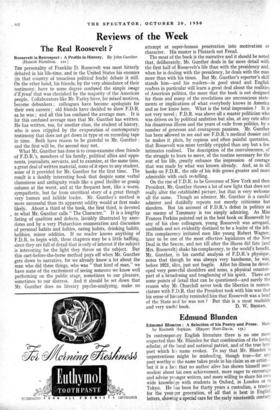Reviews of the Week
The Real Roosevelt ?
Roosevelt in Retrospect : A Profile in History. By John Gunther. (Hamish Hamilton. 255.) THE personality of Franklin D. Roosevelt was most bitterly debated in his life-time, and in the United States his enemies (in that country of tenacious political feuds) debate it still. On the other hand, his friends, by the very abundance of their testimony, have to some degree confused the simple image d'Epinal that was cherished by the majority of the American people. Collaborators like Mr. Farley have, for mixed motives, become debunkers ; colleagues have become apologists for their own careers ; old friends have decided to show F.D.R. as he was ; and all this has confused the average man. It is for this confused average man that Mr. Gunther has written. He has written, too, for another class, the student of history, who is soon crippled by the evaporation of contemporary testimony that does not get down in type or on recording tape in time. Both have reason to be grateful to Mr. Gunther ; and the first will be, the second may not.
What Mr. Gunther has done is to cross-examine close friends of F.D.R.'s, members of his family, political allies and oppo- nents, journalists, servants, and to examine, at the same time, a great deal of written material, some of it open to any student, some of it provided for Mr. Gunther for the first time. The result is a doubly interesting book that despite some verbal clumsiness and ambiguity reads like a good thriller or gossip column at the worst, and at the frequent best, like a warm, sympathetic, but far from uncritical story of a great though very human and fallible leader. Mr. Gunther's method is more successful than its apparent oddity would at first make likely. About -athird of the book, the first third, is devoted to what Mr. Gunther calls " The Character." It is a lengthy listing of qualities and defects, lavishly illustrated by anec- dotes and by a very Plutarchian enumeration and discussion of personal habits and foibles, eating habits, drinking habits, hobbies, minor oddities. If no reader knows anything of F.D.R. to begin with, these chapters may be a little baffling, since they are full of detail that is only of interest if the subject is interesting for the light they throw on the subject. But this cart-before-the-horse method pays off when Mr. Gunther gets down to narrative, for we already know a lot about the man who did these things, who was that kind of man," we have some of the excitement of seeing someone we know well performing on the public stage, sometimes to our pleasure, sometimes to our distress. And it should be set down that Mr. Gunther does no literary psycho-analyzing, make no attempt at super-human penetration into motivation or character. His master is Plutarch not Freud.
The meat of the book is the narrative and it should be noted that, deliberately, Mr. Gunther deals in far more detail with the first half of Roosevelt's life than with the presidency and, when he is dealing with the presidency, he deals with the man more than with his times. But Mr. Gunther's reporter's skill stands him—and his readers—in good stead and English readers in particular will learn a great deal about the realities of American politics, the more that the book is not designed for them and many of the revelations are unconscious state- ments or implications of what everybody knows in America and so few know here. What is the total impression ? It is not very novel ; F.D.R. was above all a master politician who was driven on by political ambition but also, at any rate after his disastrous illness and the years of exile from politics, by a number of generous and courageous passions. Mr. Gunther has been allowed to see. and use F.D.R.'s medical dossier and he makes it plain, by copious and often painful quotation, that Roosevelt was more terribly crippled than any but a few intimates realised. The description of the convalescence, of the struggle to learn to move, of the routine necessary for the rest of his life, greatly enhance the impression of courage that was made by what was known already. And, as in all books on F.D.R., the role of his Wife grows greater and more admirable with each re-telling.
On the rise of F.D.R. to be Governor of New York and then President, Mr. Gunther throws a lot of new light that does not really alter the establishtd picture, but that is very welcome all the same. Though an admirer, Mr. Gunther is a candid admirer and dutifully repeats not merely criticisms but slanders. But his account of F.D.R.'s debut in politics as an enemy of Tammany is too simply admiring. As Miss Frances Perkins pointed out in the best book on Roosevelt by any of his close colleagues, young Roosevelt was arrogant, snobbish and not evidently destined to be a leader of the left. His complacency irritated men like young Robert Wagner, later to be one of the most effective legislators of the New Deal in the Senate, and not till after the illness did fate (and Mrs. Roosevelt) shake his complacency, to the world's benefit. Mr. Gunther,' in his careful analysis of F.D.R.'s physique, notes that though he was always very handsome, he was, before 1921, slim, just not fragile. After his illness he devel- oped very powerful shoulders and arms, a physical counter- part of a broadening and toughening of his spirit. There are some points of detail that can be questioned—and surely the reason why Mr. Churchill never took the liberties in nomen- clature with F.D.R. that the President took with him was that his sense of hierarchy reminded him that Roosevelt was a head of the State and he was not ? But this is a most readable


















 Previous page
Previous page